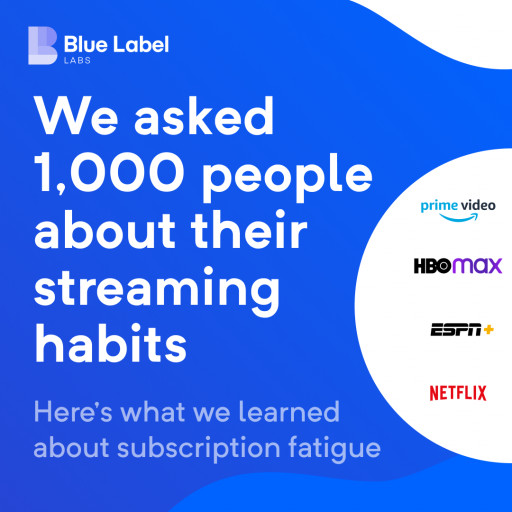
NEW YORK - October 5, 2022 - (Newswire.com)
Video streaming service providers have been feeling the effects of "streaming fatigue," with nearly two out of three people canceling services because of price and nonuse.
The industry study published by Blue Label Labs surveyed 1005 people in North America between the ages of 15 and 67, revealing which services households subscribe to and what has been canceled in the last year. It further examines the total amount each household spends on services and their sentiments as well as attitudes toward ads.
The survey conducted over the web between May 2022 and August 2022 also analyzes other dynamics between subscribers and providers.
- The most canceled streaming service reported in the last year is Amazon Prime at 9.46%, followed by Netflix at 8.55% and Disney+ at 8.33%.
- Most subscribers (37.42%) report canceling because a service goes unused, and the next most popular reason to cancel (25.88%) is because a service is too expensive.
- Regarding ads, 51.98% will deal with ads to enjoy a lower price point, 18.81% will pay to remove ads, and 19.40% report deleting apps with ads.
- Rather than use a paid streaming service, 22.42% of respondents report spending more time with YouTube's free version, 17.49% spend more time on Instagram, and 14.16% use TikTok more frequently.
Find the complete study results here: https://www.bluelabellabs.com/blog/subscription-fatigue
About Blue Label Labs
Blue Label is an award-winning, remote-first team of 100+ strategists, designers, and developers, operating around the globe.
Partnering with Fortune 500 companies and funded startups that want to grow, they build apps that truly transform businesses and connect meaningfully to the people that use them.
Contact Info
Blue Label Labs
Matteo Gasparello (Director, Marketing)
[email protected]
Contact Information:
Matteo Gasparello
Director, Marketing
[email protected]
Press Release Service by Newswire.com
Original Source: Almost 2/3s of Video Streaming Service Subscribers Canceled a Service in the Last Year, New Study From Blue Label Labs Finds